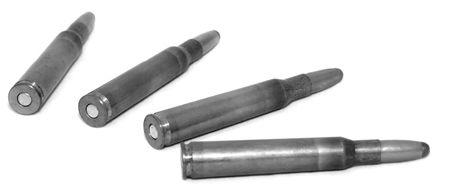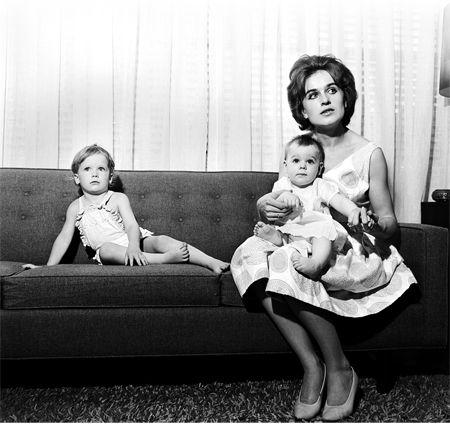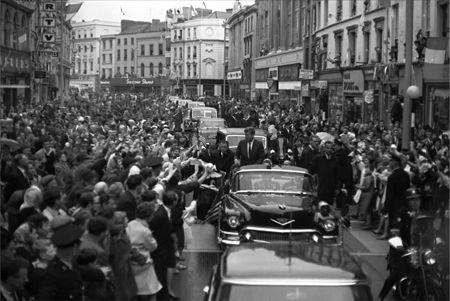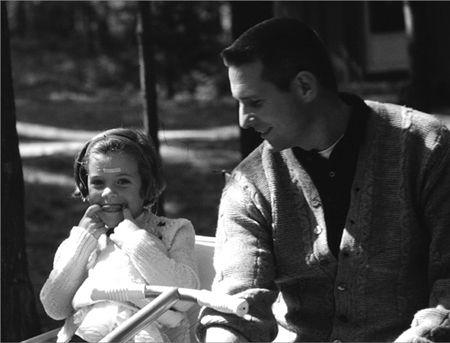Kennedy's Last Days: The Assassination That Defined a Generation (22 page)
Read Kennedy's Last Days: The Assassination That Defined a Generation Online
Authors: Bill O'Reilly

Special Agent Winston G. Lawson of the Secret Service White House detail.
[JFK Presidential Library and Museum]
Lawson then travels to Texas and interviews local law enforcement and other federal agencies, continuing his search for individuals who might be a threat to John F. Kennedy. The FBI comes up with the name of a Dallas-area resident who might be a serious threat. But it is not the name of Lee Harvey Oswald. Instead, it is a known local troublemaker who has no plans to kill the president of the United States.
CHAPTER TWENTY-NINE
NOVEMBER 16, 1963
Dallas, Texas 1:50
P.M.
T
HIRTEEN-YEAR-OLD
S
TERLING
W
OOD AIMS
his Winchester .30-30 rifle at the silhouette of a man’s head. He exhales and squeezes the trigger, then squints downrange at the target. It is Saturday. Sterling and his father, Homer, have come to the Sports Drome Rifle Range to get their guns ready for deer season.
The boy notices a young man standing in the shooting booth next to him. He is aiming at a similar silhouette. The teenager reads a lot of gun books and is pretty sure that the guy is firing an Italian carbine. It appears that the rifle’s barrel has been sawed off to make it shorter, but it’s still longer than Sterling’s Winchester by a few inches.
“Daddy,” Sterling whispers to his father, “it looks like a 6.5 Italian carbine.”

This advertisement from a gun magazine shows the type of rifle that Oswald ordered through the mail.
[© Bettmann/Corbis]
The man shoots. Flame leaps from the end of the gun because of its shortened length. Sterling can actually feel the heat from the blast. The gunman removes the spent cartridge and places it in his pocket as if he doesn’t want to leave behind evidence that he’s been there. Sterling finds it unusual that the shooter does this after each and every round.
The teenager is impressed that almost all the shooter’s bullet holes are clustered around what would be the eye if the paper target were a real man.
Sterling will later testify that he believes this man is Lee Harvey Oswald.
* * *
Oswald turned 24 just a month ago. He has little to show for his time on earth. He is in an on-again, off-again relationship with his wife and children. He works a menial job. And despite his sharp intellect, he has no higher education. He doesn’t know whether he wants to be an American, a Cuban, or a Russian.

Bullets like these were used in carbine rifles.
[© Blaz Kure/
Shutterstock.com
]
Still, he longs to be a great man—a significant man whose name will never be forgotten. And so far, the only person who seems to be impressed with him is the kid at the shooting range.

Marina Oswald with June on the left and Rachel in her lap. This photograph was taken two days after the assassination.
[© Tom Dillard/Dallas Morning News/Corbis]
CHAPTER THIRTY
NOVEMBER 18, 1963
Dallas, Texas
S
PECIAL
A
GENT
W
INSTON
G
.
L
AWSON,
Forrest V. Sorrels of the Secret Service’s Dallas office, and Dallas police chief Jesse Curry drive the proposed motorcade route from Love Field airport to the Dallas Trade Mart, a huge showroom building where the president is scheduled to give a lunch speech to 2,600 people. Special Agent Sorrels is very concerned about the many buildings and grass borders along the route. He will later testify that “during the time that we were making this survey with the police, I made the remark that if someone wanted to get the President of the United States, he could do it with a high-powered rifle and a telescopic sight from some building or some hillside.”
Nevertheless, the agents decide that this will be the presidential motorcade route.

Anytime the president of the United States drives through a crowded city, there is a careful balance between protecting his life and ensuring that the maximum number of people can see the chief executive. A perfect motorcade route doesn’t have high windows from which a sniper can poke a gun. It offers alternative routes in case something goes wrong, features wide streets that keep crowds far back from the vehicles, and has few, if any, tight turns.

This photograph shows where Secret Service agents should be when the president is in a motorcade. It was taken when Kennedy was in Cork, Ireland, in June 1963.
[JFK Presidential Library and Museum]
The Dallas motorcade route violates each of these principles.
Secret Service agents are trained to position their bodies between the president and the crowd, acting as human shields. While doing so, they are supposed to study the area and look up at windows for signs of a gunman or rifle barrel. The president’s limousine has running boards on both sides that allow the agents to shield the president while also performing this scan. They hold on to handles fixed to the car for balance. However, JFK does not like the agents to stand on the running boards because this blocks the crowd’s view of him, so they often ride one car behind.
CHAPTER THIRTY-ONE
NOVEMBER 21, 1963
Aboard
Air Force One
2:00
P.M.
T
ODAY
’
S JOURNEY BEGAN AT 9:15
A.M.
,
when John Kennedy said good-bye to Caroline as she set off to the third floor of the White House for school. John Jr., who will be three years old next week, got the privilege of riding with his parents in the presidential helicopter from the White House to
Air Force One
. The young boy enjoyed the trip immensely.
But as
Marine One
set down on the runway next to the presidential plane, young John pleaded for his journey to continue. “I want to come,” he said to his father.
“You can’t,” the president replied softly.
“It’s just a few days,” the first lady reminded the crying child. “And when we come back, it will be your birthday.”

A U.S. Army helicopter often transports the president and his family to airports or other destinations close to Washington, D.C.
[JFK Presidential Library and Museum]
John Jr. began to sob. “John, like Mummy said, we’ll be back in a few days,” the president explained. JFK then kissed his son. Turning toward the Secret Service agent in charge of the boy’s protection: “You take care of John for me, Mr. Foster,” he ordered gently.
